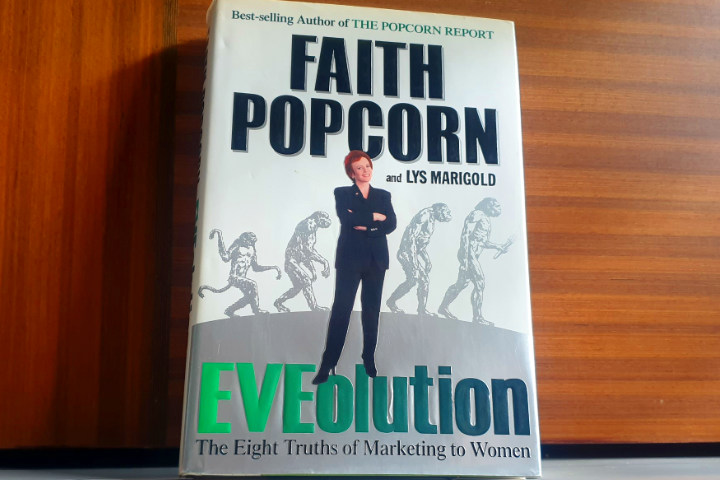An exploration into how businesses can thrive by understanding and catering to women’s needs, emphasizing the importance of female-driven consumer insights for future market success.

Faith Popcorn’s Eveolution is an investigative look into the evolving role of women in both society and the marketplace.
Published in 2000, it remains an unexpectedly relevant commentary on the rise of the female consumer. And the ways in which women’s desires, needs, and behaviors are reshaping industries, culture, and the very fabric of civilization.
Women were powerful consumers then. And one might argue that they are even more influential consumers now.
What sets the book apart from many trend-based books is the author’s ability to weave a predictive tapestry of the future with an incisive understanding of human nature, consumer behavior, and the shifting power dynamics of gender.
It’s a narrative that is at once daring and yet subtly grounded in a vision of the world that felt inevitable. A world where women, in particular, are no longer defined merely by what they buy, but by how they influence what is being bought.
Popcorn’s thesis is clear.
In that women are not just consumers but are the drivers of tomorrow’s economy. She argues that we are witnessing a “female revolution” in which women’s purchasing power and influence are taking center stage, and businesses that fail to adapt to these shifts will be left behind.
This message is underscored by her analysis of the social, economic, and cultural shifts that have led to the ascent of the female consumer.
But perhaps more than anything, what resonates most in Eveolution is how deftly Popcorn weaves together the individual woman’s evolving personal identity with the collective transformation of society. The shift from traditional gender roles to the embrace of a more multifaceted, complex woman is a subtle but powerful undercurrent throughout the book.
It’s no coincidence that the book’s title, Eveolution, is a play on both the word “evolution” and “Eve,” representing the archetype of woman as both the mother of humanity and a figure at the forefront of change.
It suggests that this evolution is both cultural and biological, tied to the way women now identify themselves in relation to their own desires.
The modern woman is evolving beyond the confines of the traditional homemaker or caretaker role. She is more than just the gatekeeper of domestic life. She is the gatekeeper of her own future. And in the consumer market, that’s a significant shift that businesses and marketers can’t afford to ignore.
It’s almost as though Popcorn is giving us a roadmap to the future, a future in which the female voice dominates not just the family dynamic but also the global marketplace.
The book also tackles the growing complexity of women’s identities. Gone are the days when a woman could be neatly categorized.
Women are increasingly multifaceted beings. Simultaneously pursuing careers, balancing family life, maintaining personal ambitions, and exploring their own identity.
There are dualities in women’s lives. they are warriors in the boardroom and nurturers in the home. This dual nature reflects the power shift that’s gradually unfolding. That women are no longer confined by traditional stereotypes, and they’re empowered to define themselves.
The book captures this shift in a way that is both insightful and celebratory, making it clear that women are the drivers of a new paradigm.
What’s also interesting is the intersection between women’s desires and the marketplace. Consumer behavior is intricately linked to identity.
Women’s choices are increasingly seen as indicators of social and cultural trends, and Popcorn gives us the tools to decode these shifts.
The book serves as both a prescient commentary on the future of consumerism and a guidebook for businesses looking to navigate the changing tides of gender dynamics. It show us how deeply women’s needs and wants are shaping industries from fashion to technology to entertainment.
For example, the rise of female-driven brands and the rise of niche products designed specifically for women’s specific lifestyle choices. It’s clear that businesses must cater to these nuanced demands, or risk becoming irrelevant.
But even though Popcorn’s vision is clearly future-facing, it doesn’t shy away from the challenges that women face in society.
Her exploration of how these evolving roles intersect with personal and societal expectations offers a nuanced look at both the victories and obstacles women encounter.
Whether it’s balancing work and home life or grappling with unrealistic beauty standards, Eveolution forces the reader to confront the complexities of the modern woman.
It’s a celebration, yes, but also a candid reflection of the hurdles that continue to exist.
In that way, the book doesn’t just offer an idealized picture of the future but acknowledges the work still to be done in the fight for true equality.
There’s also a subtle but profound critique of the marketing industry itself woven into the book. It highlights how businesses often underestimate women’s intellect and emotional depth.
The rise of the female consumer is more than just about selling lipstick or handbags. It’s about understanding the deep emotional needs that drive women’s purchasing decisions. The needs for connection, authenticity, and personal growth.
If businesses continue to pander to stereotypes or fail to take these deeper desires seriously, they’ll miss out on the opportunity to connect with a powerful and evolving audience.
To sell a product to women, you must first understand the complexity of the woman behind the purchase.
Women should be seen as powerful agents of change whose preferences and purchasing decisions shape industries.
This perspective is both empowering and eye-opening, reminding us that in the grand theater of consumerism, women are not just playing supporting roles. They are very much the leading ladies.
Shortcomings
An area that could be improved is in its exploration of diversity among female consumers.
While the author effectively addresses the general influence of women in the marketplace, the book could benefit from a deeper examination of how different backgrounds, cultures, and identities shape consumer behavior.
By broadening its scope to include a more diverse range of perspectives, it could offer even richer insights into the complexities of the female market.
At times, I also felt like the author was overselling the female consumer wave. But I mean… what else should one expect when the title of the book itself is eveolution…
Biggest Takeaway
There must be a recognition and acknowledgement that the world is changing, and women are at the center of that change.
This is a call-to-action whether you’re a marketer, a business owner, or simply someone interested in the evolving landscape of gender and society.
Women are not just passive consumers. They are active participants in shaping the world of today and tomorrow.
The transformation of women from mere consumers to cultural architects is not just an economic shift, it’s a cultural revolution.
By truly listening to women and valuing their contributions, businesses can unlock new opportunities for growth and success. It can definitely foster long-term brand loyalty.
The book challenges traditional marketing paradigms, urging businesses to adapt to the nuanced needs and desires of women, who are the primary drivers of economic change in the 21st century.
I also find the book’s forward-thinking approach notable.
Readers are challenged to envision a future where businesses are not just reactive but proactive in their engagement with female consumers. A call for marketers to evolve from mere merchants to allies in the consumer journey.




